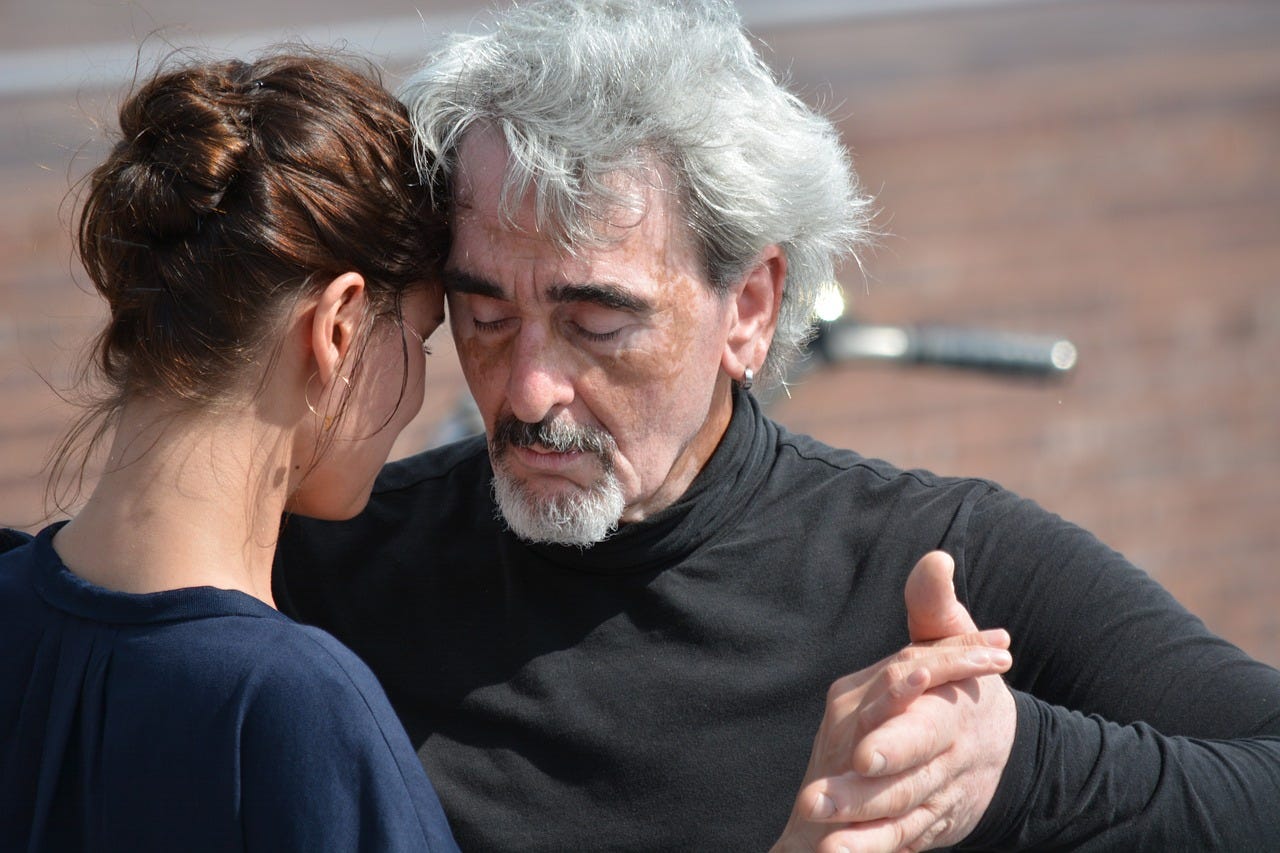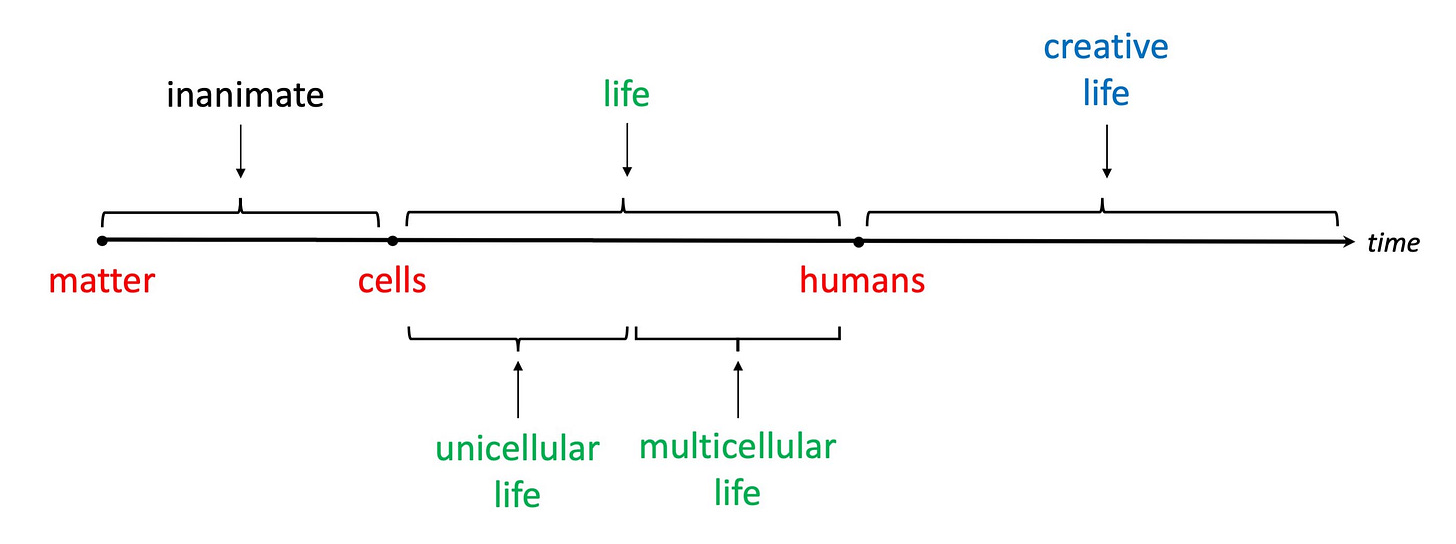Yes, we have free will. It arises from the tool that distinguishes us from all other known life forms on this planet: the mind. But possessing something differs from using it. Therefore, the more exciting question is: do we use our free will? In the following, I explain that we have free will and why, and why most people hardly ever use it.
What does it mean to will or desire something? The word ‘will’ has the root *wel-, which means ‘to choose.’ To will is to choose a fictitious mental image with the intention of it becoming real. For example, you can will to raise your right arm. To do this, you choose the corresponding mental image and intention. If there is no physical impairment, the arm goes up immediately. I explain why it does in my article “How Your Thoughts Affect Matter.”
You can also imagine raising your right arm without the intention of doing so. This could be described as “mind movie” – although this also influences your body, just not immediately.
Not every mental image becomes real immediately despite the intention. If you want to slow down your heartbeat, for example, this is possible if you hold the image and intention long and intensely enough. Here, your intention combines with the automatic processes in your body. It may, therefore, take longer to become reality – or it may only happen in part. This is known as the placebo effect. In many cases you need more than just perseverance in choosing image and intention. If you want to be a concert pianist, for example, you also must do something, such as practicing; and it helps if it is your life’s purpose. But more on that later.
Because we can think, we have free will ... and are creative. Free will, the ability to think, and creativity are closely related. I analyze thinking in my article “This is the Difference Between Humans and Animals.”
However, people only use their free will rarely. The reason is that we have become social robots. This has happened and continues to happen because children copy their environment, primarily their parents. Over thousands of generations, people emerged whose behavior, thinking, and thus also willing is over 99% generated by social programs. Over 99% of the time, people do, think, and will what they have learned to do, think, and will. I describe this situation as a metaphor in my article “Why the Question ‘What Am I?’ is Important and Magical.”
People use their free will less than one percent of the time. For most people, it’s as low as 0.01%. These numbers may shock you. But this is nothing new. Around 2,300 years ago, the Greek philosopher Aristotle recognized people are largely controlled by programs – he called them habits:
„95% of everything you do is the result of habit.“
(Aristotele)
So even the ancient Greeks lived 95% as robots – at a time without TV, radio, internet, etc. Because of these media, it is 99 to 99.99% today.
Why do we have free will? There are two answers to this question: a technical one and a philosophical one. The technical answer is complex and goes beyond the scope of this article. I answer most of it with the help of my Theory of Mind in my book “Consciousness – It’s Nature, Purpose, and How to Use It.”
Philosophically, this question has an answer if we recognize the universe as a great whole in which everything and everyone has its place and purpose – just as every cell in your body has its place and purpose. This is because of an order of things – in the universe and in your body. The order of the universe is usually referred to as cosmos; kosmos is the Greek word for order.
The earth is around 4.6 billion years old. Humans have been around for an estimated 300,000 years. To put this into perspective, let’s imagine the age of the earth as a 24-hour day. In this picture, we have been around for 6 seconds.
Before we appeared, an increasingly complex biosphere evolved over the course of several billion years. It was like a cosmic bio-computer simulation. In fact, cells, plants, and animals are cosmic bio-robots – in the sense that they cannot help but follow their behavioral programs and cosmic guidance.
Admittedly, it is not easy to recognize cells, plants, and animals as bio-robots because their behavior appears very complex. The reason is their intuitive connection to the cosmos. As a result, their behavior not only depends on their sensory perceptible environment, but potentially on the entire universe. An impressive example is the 2004 tsunami, in which almost no animals died, but many people did. See my articles “Intuition is Much More Than Just a Sixth Sense” and “Why 230,000 People Died in the Tsunami – but Almost No Animals.”
Our appearance on this planet caused a quantum leap that has really taken off only in the last 300 years. In the 24-hour picture, that’s 0.006 seconds. In this time, we created countless things that have not evolved in billions of years and would never evolve naturally, such as plastic, cell phones, and airplanes. This quantum leap in evolution shows that we are fundamentally different from cells, plants, and animals. This difference is our ability to think … or our creativity ... or our free will – which is all the same.
In the billions of years before us, there have already been quantum leaps on Earth. The first was the emergence of life. Then there was a smaller quantum leap from unicellular to multicellular life. Humans mark the quantum leap from robotic to creative life. That was a reasonable next step, because only then could non-natural things come into existence. Therefore, our free will makes sense.
On the one hand, we have free will, even if we rarely use it. On the other hand, like everything in the universe, we have a purpose as part of the whole, and the cosmos constantly urges us to fulfill this purpose. How does that fit together?
Cells, plants, and animals follow the cosmic urge without restriction and, therefore, fulfill their purposes. An oak tree fulfills its purpose of being an oak tree. A cheetah fulfills its purpose of being a cheetah. In doing so, they contribute to the balance within the planet’s biosphere. Through our free will, we can choose to fulfill or not to fulfill our purpose. This does not mean that we can place ourselves outside the universal order. Nothing and no one can. Within the universal order, everything has consequences – like a balance scale: if you put something in one pan, the other goes up.
If you fulfill your purpose in life, you experience maximum fulfillment; some call this bliss. If you don’t fulfill your purpose, you experience a longing for fulfillment instead. Although we learn to try to satisfy this longing with substitute methods, such as food, sex, or drugs, this is in vain. In addition, unpleasant life situations can arise, such as illnesses and accidents. These are nothing other than cosmic guidance: they push you toward your life’s purpose. Therefore, in such situations, you should ask: “What is this trying to tell me?”
The cosmos permanently guides you; whether you realize it or not; whether you comply or resist. I call surrendering to cosmic guidance “dancing with the cosmos.” Let’s take a look at the role free will plays in this.
(1) Since people live as robots over 99% of the time, hardly anyone today fulfills their life’s purpose. You can use your free will to question your life. Perhaps you will recognize your robot existence and its extent.
(2) Once you have recognized this, you can use your free will to want to free yourself from your programs. In doing so, you choose the path of becoming free.
(3) The path of becoming free comprises observing yourself and exploring where your behavior and thoughts come from. On this path, you must use your free will every day to keep going. I describe the method of self-exploration in my article “How to Become What You Truly Are in 7 Steps” and in my book “Being Free – Get Out of the Box.”
(4) The more programs you have freed yourself from, the more clearly you will recognize your purpose in life. You can then use your free will to live your life’s purpose.
(5) If you do this, you will have landed on your life path. You must also use your free will anew every day to stay on it.
(6) You can also exercise your free will on your life path. You can choose how you follow the cosmic guidance and live your life's purpose. You can do this without passion – or full of enthusiasm and with grace. Imagine a dancing couple: one person leads, the other follows. In life, the cosmos leads and you follow. Look at dance couples in real life or on the internet: Ballroom dancing, Argentine tango, salsa, .... then you'll know what I mean: the person being led can passively let themselves been dragged around the dance floor like a sack of potatoes ... or actively contribute to the creation of an artwork of two bodies.
Let's summarize: Your life purpose is predetermined – and so is your life path; because you are a part of the whole and have a purpose in it. With your free will, you can choose to find your life’s purpose; then you can choose to fulfill your life purpose; and, finally, you can choose how you fulfill it.
Further reading:
Article “How Your Thoughts Affect Matter”
Article “This is the Difference Between Humans and Animals”
Article “Why the Question ‘What Am I?’ is Important and Magical”
Book “Consciousness – It’s Nature, Purpose, and How to Use It”
Article “Intuition is Much More Than Just a Sixth Sense”
Article “Why 230,000 People Died in the Tsunami – but Almost No Animals”
Article “How to Become What You Truly Are in 7 Steps”
Book “Being Free – Get Out of the Box”
See also:
Article “Why and How You Have Much More Influence on Your Body Than You Think”
Article “Why and How Your Body Helps You to Free Yourself from Your Programs”






“…How does being free, to ask yrself if you are free, not answer itself …” (from a poem of mine, “inda noise of now”)
I never said this was my podcast. I was merely keen to hear your take. It is from Sam Harris who is a very well known podcaster who has a very convincing stance on the top of free will